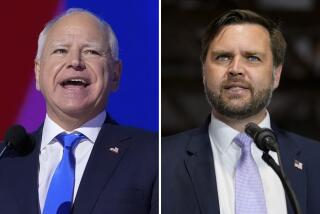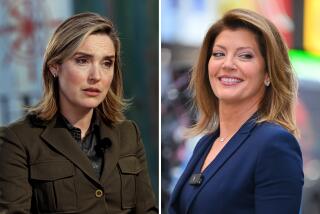Networks Plan to Air at Least 7 Presidential Democrat Debates
- Share via
WASHINGTON — The nation’s seven commercial and public television networks, in an unprecedented move that will bring greater attention to Democrats seeking their party’s presidential nomination in 1992, have agreed to televise at least seven prime-time debates among the party’s candidates.
The first debate will be broadcast by NBC in Washington on Dec. 15 and others will follow as the nominating process unfolds, it was announced Thursday. CNN has scheduled the second debate for Feb. 16 at St. Anselm’s College in Manchester, N.H.
By providing a series of nationally televised debates as an alternative to the host of local and regional forums that existed in the 1988 primary campaign, the agreement will give Democratic candidates potentially valuable exposure to the entire electorate early in the process, party officials believe.
“This gives the Democrats what they have to have--exposure, and the opportunity for the American people to get comfortable with one of them as an alternative to President Bush,” said former Democratic National Committee Chairman John C. White. “It will give the nominee a chance to define himself instead of having Roger Ailes (Bush’s media adviser) define him the way he did (Democratic standard-bearer) Michael Dukakis in 1988.”
To realize that potential, Democratic candidates must develop messages with strong appeal to masses of voters and avoid the in-fighting that sometimes has diminished the challengers’ apparent stature in relation to an incumbent President.
Nevertheless, the debates could provide an opening for Democratic hopefuls at a time when many in the party have begun to think that the recession-bound economy and other domestic problems could make President Bush vulnerable in 1992.
Carl R. Wagner, project manager of Debates ’92 and a Democratic political consultant, said that with the national electorate as the primary audience, the debates will focus on general national issues rather than the regional matters and single issues that dominated the 1988 Democratic primaries.
Debates ’92 was organized earlier this year by Citizens Vote, a liberal, nonprofit, nonpartisan voter education program based in New York.
Democratic Party Chairman Ron Brown, who engineered the debate agreement by quietly securing the candidates’ approval before Debates ’92 lined up the networks for 15 hours of prime-time television, called it “a terrific development that will make a real difference in the primary process.”
In 1988, presidential candidates of both parties participated in 60 debates that were primarily focused on regional matters or single issues of special interest to sponsoring organizations. Democratic candidates alone participated in 46 forums, although only a couple of them were nationally televised.
“For the candidates to get jerked around the country to do 60 or so joint appearances was ridiculous,” said Brown. “The Sheboygan League of Women Voters tells Richard Gephardt (Missouri congressman and 1988 Democratic candidate) to show up because all the candidates would be there, and he shows up and finds only one other candidate there. Ridiculous.”
In addition to NBC, the debate agreement involves CBS, ABC, CNN, Fox, PBS and C-SPAN. Wagner said that Debates ’92 will work with the networks and the candidates in refining the schedule, reviewing formats and sites, providing press facilities and promoting the debates.
But the originating network will have final authority over the format and the naming of participants. That means, Brown said, that a sponsoring network could limit the debate to only two or three candidates.
So far there are six nationally prominent Democrats who have declared their candidacy: Former Gov. Edmund G. (Jerry) Brown Jr. of California, Gov. Bill Clinton of Arkansas, Gov. L. Douglas Wilder of Virginia, Sen. Tom Harkin of Iowa, Sen. Bob Kerrey of Nebraska and former Sen. Paul E. Tsongas of Massachusetts.
More to Read
Get the L.A. Times Politics newsletter
Deeply reported insights into legislation, politics and policy from Sacramento, Washington and beyond. In your inbox twice per week.
You may occasionally receive promotional content from the Los Angeles Times.










